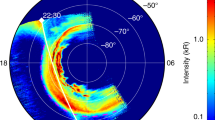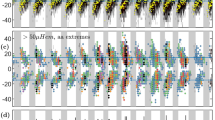Abstract
From all-sky camera recordings taken at this Observatory (geographic co-ordinates 67.8° N., 20.4° E.; geomagnetic co-ordinates 65.3° N., 115.5° E.) during the period December 1958 – March 1961 the directions of 366 quiet auroral arcs were measured. Only arcs extending from horizon to horizon, or at least covering an angle of view of about 100° for the most distant arcs and having an elevation angle of more than 15° for the highest point, were used in the analysis.
This is a preview of subscription content, access via your institution
Access options
Subscribe to this journal
Receive 51 print issues and online access
$199.00 per year
only $3.90 per issue
Buy this article
- Purchase on Springer Link
- Instant access to full article PDF
Prices may be subject to local taxes which are calculated during checkout
Similar content being viewed by others
References
Störmer, C., The Polar Aurora (Oxford, 1955).
Alfvén, H., Cosmical Electrodynamics (Oxford, 1950).
Lassen, K., Nature, 184, 1375 (1959).
Author information
Authors and Affiliations
Rights and permissions
About this article
Cite this article
HULTQVIST, B., EGELAND, A. & GUSTAFSSON, G. A Morning Discontinuity in the Orientation of Quiet Auroral Arcs. Nature 192, 956–957 (1961). https://doi.org/10.1038/192956a0
Issue Date:
DOI: https://doi.org/10.1038/192956a0
Comments
By submitting a comment you agree to abide by our Terms and Community Guidelines. If you find something abusive or that does not comply with our terms or guidelines please flag it as inappropriate.



